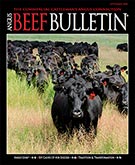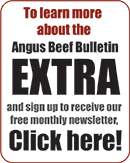Sunflower Supreme Replacement
Heifer Program Expands
Kansas cow-calf producers in more locations can enroll; improving management techniques and marketability is goal.
Coming to central Kansas — the Sunflower Supreme Replacement Heifer Program. The program, which began in 2013 in southeast Kansas, has no true borders in terms of producers being able to enroll, according to program director Jaymelynn Farney. Anyone who would like to enroll is allowed and can potentially market heifers at special sales to be hosted in southeast Kansas or Salina at the Farmers and Ranchers Livestock Market.
Developed by Kansas State University (K-State) and the Kansas Department of Agriculture, the program is for Kansas beef producers who want to improve their management techniques and marketability of their heifers. Heifers that are ultimately certified have been minimally managed the same from an important health, breeding and sire selection standpoint, she said. Its guidelines, which are based on best management practices, can be found at www.sunflowersupreme.org. They can be implemented within any cattle operation.
Farney, who is a beef cattle specialist with K-State Research and Extension based in Parsons, summarized key guidelines.
Health: All heifers must be tested and negative for bovine viral diarrhea persistent infection (BVD-PI).
“Since a PI animal will be infected and shedding the virus for life, making sure you are not introducing a known abortion-causing virus into your herd is the first health concern associated with the program,” Farney said.
Since the goal is to maintain pregnancy, vaccination against other abortion-causing pathogens such as leptospirosis, vibriosis, BVD and infectious bovine rhinotracheitis (IBR) is included in the protocol.
Breeding: A 60-day breeding season is the maximal length for Sunflower Supreme heifers whether artificially inseminated (AIed) or only exposed to a bull. Producers have the option to choose whichever breeding option (AI only, natural service only, or a combination of AI and natural service) and have options to choose a synchronization program. Heifers will be pregnancy-checked early so veterinarians can estimate an expected calving date. That helps owners when calving time comes. It also allows for sorting based on calving date to be better able to watch and mitigate some of the extra labor associated with calving out heifers.
Sire selection: Sunflower Supreme certified heifers must be bred to bulls that meet minimum calving ease (CE) expected progeny differences (EPDs) based on breed. Calving ease is an economically relevant trait that is used as an estimator of birth weight and gestation length, both of which are involved with calving difficulty. The EPDs are calculated using information from the calving of 2-year-old females and birth weight information of the bull’s progeny.
Once heifers have met the program’s requirements, they are tagged with an official Sunflower Supreme ear tag. The idea, Farney said, is to establish longer longevity within an operation and generate consistent revenue.
“These certified heifers can be marketed or retained in your operation,” she said.
More information about the program is available at www.sunflowersupreme.org or by contacting Farney at 620-820-6125 or by email at jkj@ksu.edu. Producers can also contact their county or district K-State Research and Extension agriculture agent to enroll in the program and find out when educational meetings will be coming to their area.
Editor’s Note: This article is provided by K-State Research and Extension.







